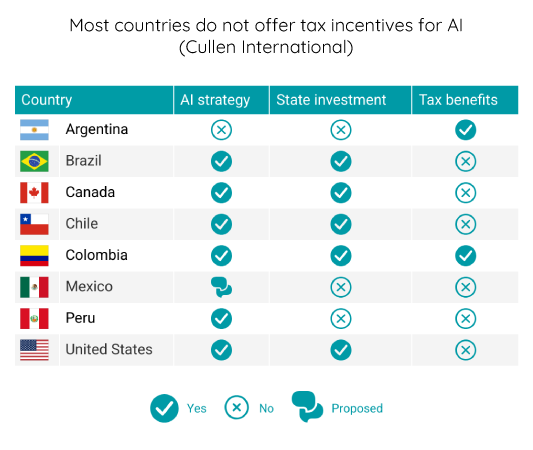Most countries in the Americas have adopted or are discussing broad strategies or regulations on artificial intelligence (AI). Cullen International’s latest research shows that AI policy has been a key issue for the region, with important decisions on the horizon.
The US’ recently published AI Action Plan outlines over 90 federal policy actions nominally designed to help the USA achieve global AI “dominance”. These actions are organised around three pillars: accelerating AI innovation; building American AI infrastructure; and leading international AI diplomacy and security.
Other countries in the region are also taking significant steps towards defining their AI policy goals and regulations. Canada consulted on the future direction of its AI strategy with a view to maintaining AI “leadership”.
The Colombian government introduced a broad AI bill, drawing on previous legislative proposals and inputs from academia, the private sector, and civil society.
A bill on AI is also under discussion in the Brazilian Congress. If approved, the bill would impose transparency and ethical obligations on AI developers, and require them to conduct risk-mitigating measures.
The strategies for fostering AI vary across the region. Some governments invest in AI research, workforce skills, and access to computing hardware. Argentina and Colombia are the only countries to offer tax incentives for AI developers.

To access the full benchmark, please click on “Access the full content” - or on “Request Access”, in case you are not subscribed to our Americas Digital Economy service.
more news
25 February 26
Protection of minors: overview of national initiatives on banning access to social media
Our latest benchmark shows that an increasing number of European countries are discussing a potential social media ban on children.
23 February 26
The DNA explained: universal service to serve the same goals under a revised approach
Cullen International is issuing a series of analyses on different aspects of the Digital Networks Act (DNA) proposal. This report covers universal service.
20 February 26
Revised Cybersecurity Act (CSA2) - Changes to the EU cybersecurity certification framework
Cullen International published an analysis of the proposed changes to the EU cybersecurity certification framework under the draft Cybersecurity Act 2 (CSA2) delivered by the European Commission on 20 January 2026.